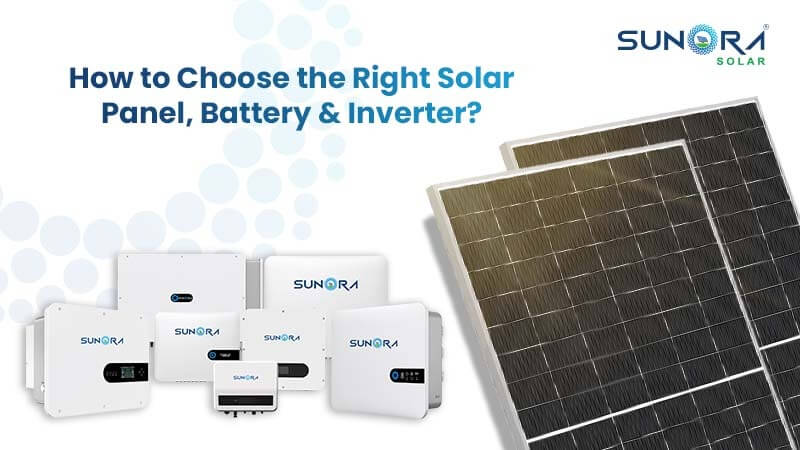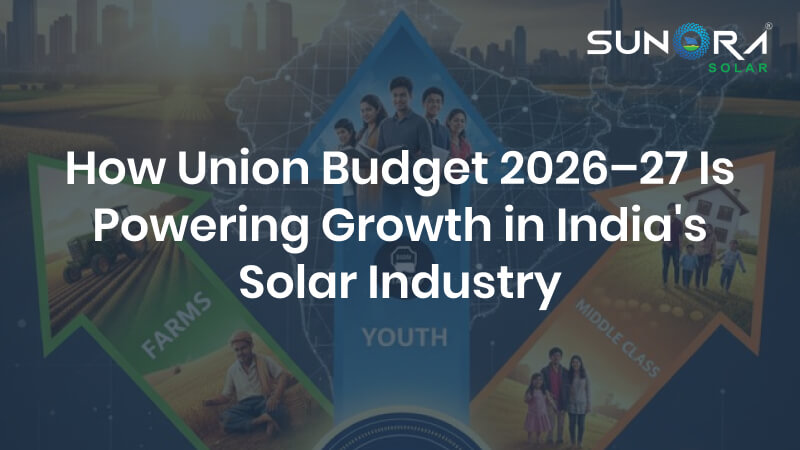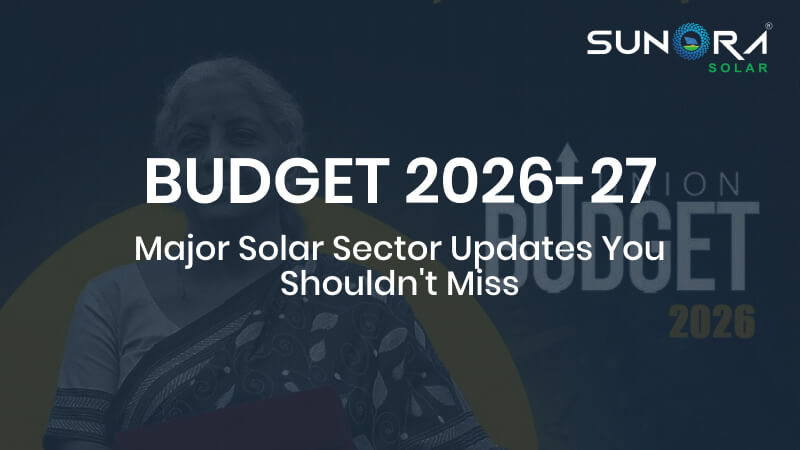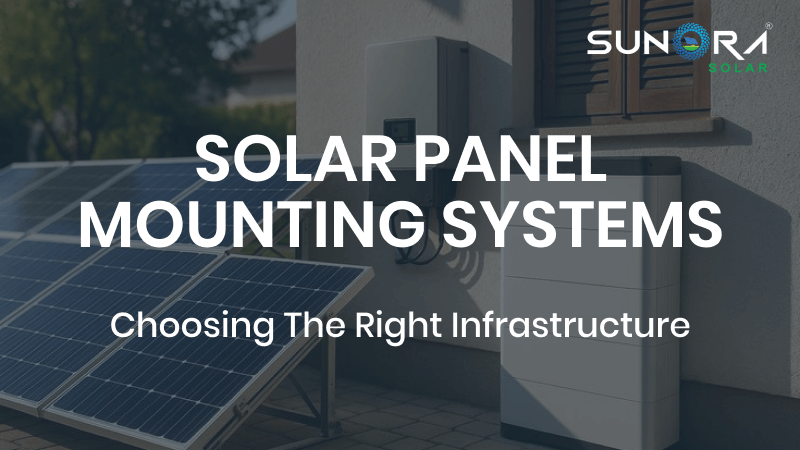Nature can give and also take away electricity. While the sun helps us generate renewable energy, rain can hinder the solar system’s electricity generation and also result in a power outage. That’s where choosing the right inverter and batteries becomes essential. In this blog, we will provide you with a guide on choosing the right solar panel with a battery and an inverter.
Whether you want an on-grid or off-grid solar system, you must understand how solar inverters and batteries work to get the best ROI. Sunora Solar is here to answer all your queries. Contact us with your queries now!
How to Choose the Right Solar Panel for the Home?
Solar panels are the soul of your solar system. Therefore, you should choose the right ones for better efficiency and ROI.
You have a wide range of solar panels to choose from. A few of the best-performing solar panels are:
- Monocrystalline TOPCon solar panel
- Mono PERC solar panels
- Bifacial solar panels
But how do you choose the solar panel size and capacity?
You need to consider a few things, such as:
- Power requirement:
Calculate how much power your appliances use. This energy should be calculated in watts. The key is determining the wattage needed based on how long you’ll need these appliances running.
- Solar panel efficiency & output:
Choose the solar panel based on the efficiency that meets your energy requirements. A monocrystalline bifacial solar panel is one of the best options for providing higher output in a limited space.
How to Choose the Right Inverter for the Home Solar Panel?
The solar system needs an inverter to convert the DC generated by the solar panels into AC to power your appliances. The inverter will be connected directly to the battery to store electricity.
The following three types of inverters are available in India:
- String inverter: It is a centralized inverter connected to the solar panel. They are often chosen for systems with better sunlight exposure and no shade.
- Microinverters: These smaller inverters are connected to each solar panel. Therefore, you can track the performance of each panel and identify any problems in the early stages.
- Hybrid inverter (Optimizer): The solar system has both a central inverter and microinverters. However, the microinverters don’t convert the DC entirely; they optimize it and then send it to the central inverter. Thus, low production in one solar panel doesn’t affect the efficiency of the whole solar system. They are more efficient than a string inverter and cheaper than microinverters.
When choosing the inverter for your solar panel, you should consider the energy requirement (discussed in this blog) and the inverter’s VA rating.
The Volt-Ampere (VA) rating helps us understand the power supply capacity of the inverter. The VA rating of the inverter should be higher than your power requirements for smooth use.
The VA rating is determined by dividing your Power Requirements by the Power Factor. The Power Factor is the ratio of the power required by the appliances to the power supply. On average, this factor has a value of around 0.7 to 0.8.
If you still have doubts or need assistance, we are here to help you! Sunora Solar created high-quality inverters to fit household power needs. We can help you determine what VA rating will be sufficient for your needs.
How to Choose the Right Battery for the Home Solar Panel?
If you want to set up an off-grid or hybrid solar system, you’ll need a battery to store the power. It is useful if you live in areas with inconsistent sunlight or unpredictable grid power. The batteries provide backup when the solar system isn’t generating electricity.
The battery capacity is measured in Ampere Hours (Ah). You can find your Ah requirement using the following equation:
- Power requirement (watts) * backup hours/battery voltage (V)
- Choose a battery capacity higher than what you require.
- Sunora Solar can help you find the best solar panels, inverter, and battery for your solar system. Contact us now for a consultation.
Conclusion
When choosing a solar panel with a battery and an inverter, you must know your power output requirements, the Volt-Ampere (VA) rating of the inverter, and the battery’s Ampere Hours (Ah) capacity. It helps you set up an efficient solar system that can provide backup when the solar panel isn’t in action or there is an outage. Sunora Solar can help you find the best solar panels, inverters, and batteries. Contact us now for assistance!
FAQ
How to choose the right inverter for my solar panel?
You can choose the right solar inverter based on your power requirement and VA rating. You should also explore different types of inverters, such as string inverters, microinverters, and hybrid inverters, as they all have different benefits. Sunora Solar has the best solar inverters! Explore our website or contact us for consultation.
Why do I need an inverter for a solar panel?
The inverter converts the direct current (DC) generated by the solar panels to alternating current (AC) used by most of your appliances. Therefore, they are essential to use the power generated by the solar panel.
Can I upgrade my existing solar system?
Absolutely! You can upgrade your existing solar system by adding more solar panels. You can also change the inverter and battery to meet your power needs. Sunora Solar can help you effortlessly upgrade your solar system to meet your power requirements.
How long does the solar panel last in India?
The solar panels in India can last almost 25-30 years. The PERC and TOPCon solar panels provide the best efficiency over a long time. However, you must maintain the solar panels with regular cleaning and professional maintenance services. Sunora Solar offers the best Operation & Maintenance services to ensure that your solar system works at full capacity and identifies any default in the early stages. Contact us to know more!




